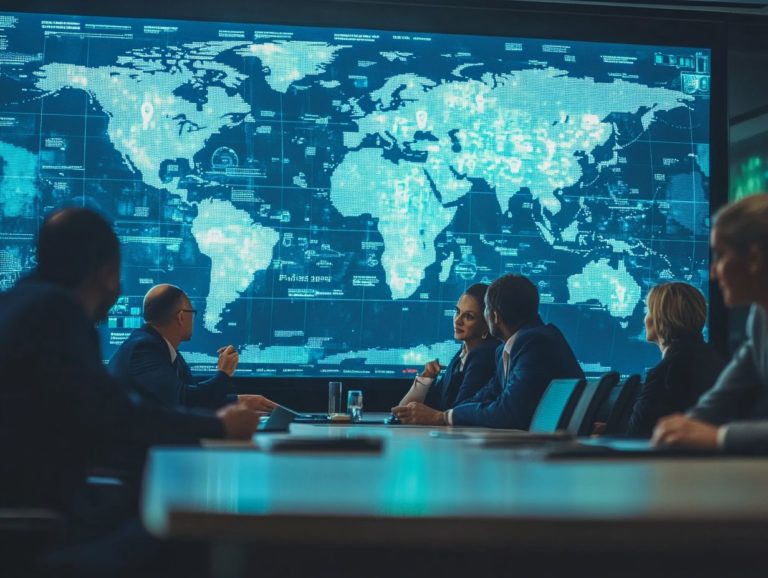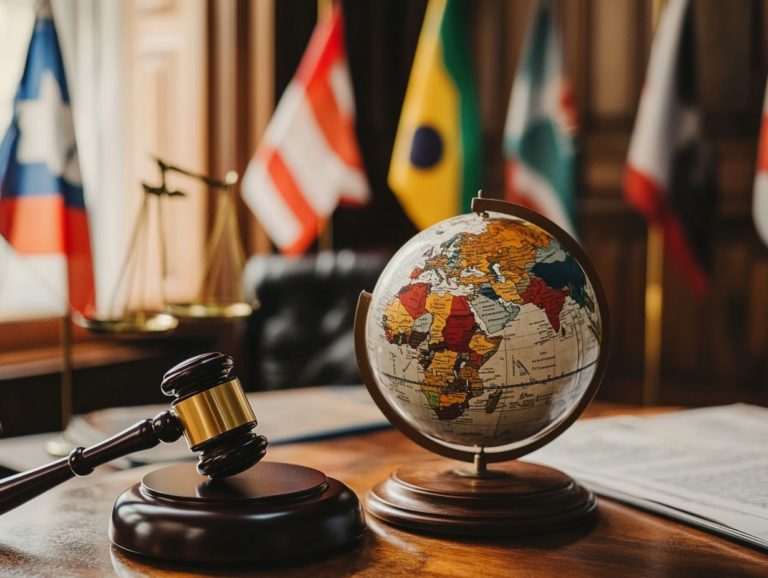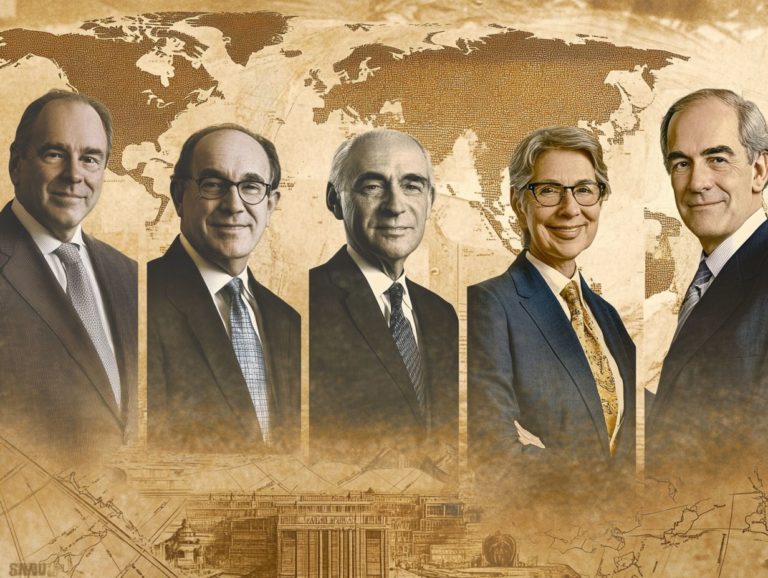How to Enforce IP Rights Internationally
In today s increasingly globalized world, protecting your intellectual property rights is more crucial than ever. Intellectual property refers to creations of the mind, like inventions, designs, and artistic works.
This article explores international IP laws. It highlights how various agreements shape these laws.
You will discover the challenges of enforcing these rights across borders. Effective strategies to navigate the intricate legal landscape will also be discussed.
The importance of collaborating with local authorities will be emphasized, along with best practices for protecting IP in international business transactions.
Real-world case studies will provide illuminating examples of successful enforcement, offering valuable lessons for anyone involved in the international IP arena.
Contents
- Key Takeaways:
- Overview of International IP Rights
- Challenges of Enforcing IP Rights Internationally
- Strategies for Enforcing IP Rights Internationally
- Working with International Authorities
- Protecting IP Rights in International Business Transactions
- Case Studies of Successful International IP Enforcement
- Frequently Asked Questions
- What are Intellectual Property (IP) rights, and why is international enforcement essential?
- How can I protect my IP rights across borders?
- What are some common challenges in enforcing IP rights internationally?
- Are there alternative methods to enforce IP rights internationally?
- What should I do if I suspect my IP rights have been infringed internationally?
- Can I enforce my IP rights internationally on my own?
Key Takeaways:

- Understanding international IP laws is essential for effective enforcement.
- Challenges exist, but protecting your intellectual property is crucial.
- Collaboration with local authorities is key to success.
- Implement practical strategies for better protection.
Overview of International IP Rights
International Intellectual Property Rights encompass a comprehensive array of protections, including patents, trademarks, and copyright. These protections are vital for safeguarding your innovations and creative works on a global scale.
Governed by various international laws and agreements, these rights establish a cohesive framework for the protection of intellectual property. The United States, along with other nations, adheres to treaties set forth by the World Intellectual Property Organization (WIPO).
This adherence ensures you can enforce your rights and seek justice in foreign jurisdictions. It allows your creativity to flourish without borders.
Explanation of International IP Laws and Agreements
International IP laws and agreements, such as the Berne Convention and the TRIPS Agreement, establish standardized protections for patents, trademarks, and copyright across various countries.
These frameworks are essential in creating an environment where you can thrive. They safeguard your innovations on a global scale.
By providing standardized protections, these laws harmonize intellectual property rights across different legal systems. You can engage in cross-border trade with confidence, knowing your unique products and services are protected from unauthorized use.
As a result, you can leverage these laws to secure your competitive edge. This fosters innovation while contributing to a more integrated global commerce landscape.
The participation of numerous countries in these agreements signifies a shared recognition of the importance of protecting creative efforts and inventions. This ultimately drives economic growth and prosperity.
Challenges of Enforcing IP Rights Internationally
Enforcing intellectual property rights on a global stage presents a myriad of challenges. These include navigating international IP disputes, complex legal frameworks, cultural nuances, and differing enforcement capabilities across nations.
As you expand your business operations internationally, you may encounter disputes stemming from varying interpretations of IP laws. This often necessitates arbitration and mediation to resolve conflicts effectively.
The effectiveness of cease-and-desist letters varies widely depending on the jurisdiction. Local regulations governing IP rights further complicate the endeavor to protect your intellectual property on an international scale.
Common Obstacles and Difficulties
Navigating international IP rights enforcement comes with many challenges. Different legal systems, local customs laws, and piracy issues can complicate the landscape, making it essential to learn how to enforce your patent rights effectively.
Take the European Union. Its regulations can vary greatly from those in Asia, leading to confusion and inconsistent enforcement.
For example, a major tech company faces significant counterfeiting in China, where local laws often overlook foreign IP protections.
Customs authorities play a key role by seizing counterfeit goods before they reach consumers. Building strong relationships with local customs and legal entities is vital for success.
This strategy helps ensure compliance with local laws and leverages available resources to protect your intellectual property.
Strategies for Enforcing IP Rights Internationally

To enforce IP rights internationally, you need a flexible approach. Understanding the legal frameworks and working with local authorities is essential, as well as knowing how to enforce your copyright rights.
Tailor your strategies to fit the legal environments of each country. This ensures you re prepared for the unique challenges of each market.
Being adaptable is crucial for maintaining strong IP protections and effectively managing disputes.
Effective Legal and Practical Approaches
Strong legal and practical strategies for enforcing your IP rights include careful registration with the United States Patent and Trademark Office (USPTO). Additionally, learning how to enforce your trademark rights and utilizing international treaties can further strengthen your protections.
When enhancing your IP strategies, filing applications in multiple jurisdictions is a smart move. The Patent Cooperation Treaty (PCT) simplifies the international filing process.
Trademark protection is also streamlined through the Madrid Protocol. But beyond registration, it’s important to actively monitor for any infringements.
Work with local legal counsel to develop targeted strategies that fit specific legal environments. This ensures your rights are defended and any breaches are quickly addressed.
Working with International Authorities
Partnering with international authorities is key to enforcing IP rights. For more information on how to enforce your trademark rights, collaborating with local law enforcement and government agencies significantly enhances your protection efforts.
Build strong relationships with customs authorities to take swift action against counterfeiting and piracy.
Engaging with organizations like the World Intellectual Property Organization (WIPO) provides valuable resources. This support helps you navigate international IP challenges with confidence.
Collaborating with Local Law Enforcement and Government Agencies
Collaborating with local law enforcement and government agencies is essential for effectively enforcing your IP rights. These entities play a pivotal role in monitoring and addressing violations within their jurisdictions.
Such partnerships often unfold through joint operations, where both sectors exchange critical intelligence about counterfeit goods and infringement activities. This exciting partnership between a prominent technology company and a regional police department led to significant arrests and the seizure of large quantities of counterfeit electronics.
Not only did this protect the company’s IP rights, but it also demonstrated the significant financial rewards of strong enforcement to local authorities. Educating these officials about intellectual property (IP) can cultivate a deeper understanding of its implications, enabling them to act more decisively.
When local governance recognizes the commercial advantages of these initiatives, it enhances the community’s overall economic health and fosters a culture of vigilance against IP violations.
Protecting IP Rights in International Business Transactions
Protecting your intellectual property rights in international business transactions demands careful planning and an understanding of various legal frameworks to safeguard your IP against potential infringements.
This may involve negotiating licensing agreements that clearly state how your intellectual property can be used, alongside seeking legal counsel to navigate the intricacies of international law.
Creating agreements and using best practices helps reduce risks and reinforces your position in global markets.
Key Considerations and Best Practices

Key considerations and best practices for protecting your IP rights in international transactions include conducting thorough due diligence, establishing clear licensing agreements, and seeking legal advice to navigate complex regulations.
To safeguard your intellectual property, it’s essential to carry out comprehensive research on potential partners, assessing their reputation and track record in the industry. Understanding local laws is equally crucial, as regulations can vary significantly from one jurisdiction to another.
When crafting effective licensing agreements, it s vital to ensure that the rights and responsibilities of all parties are clearly defined. Ongoing monitoring of your IP rights in foreign markets is also essential.
This vigilance allows you to identify potential infringements and ensures that agreements are upheld over time, ultimately minimizing risks and fostering stronger business relationships.
Case Studies of Successful International IP Enforcement
Case studies of successful international IP enforcement offer invaluable insights into effective strategies and navigating common obstacles in protecting intellectual property rights across borders, highlighting the role of international law in IP litigation.
By examining these real-world examples, you can glean lessons from the successes and challenges encountered by others in their pursuit of enforcing IP rights.
These studies often emphasize the need to tailor enforcement strategies to various legal landscapes and to leverage local resources effectively, ensuring a more robust approach to protecting your intellectual property.
Stay proactive and protect your IP rights today!
Real-World Examples and Lessons Learned
Real-world examples of international Intellectual Property (IP) enforcement reveal the varied strategies you can employ to safeguard your intellectual property while highlighting valuable lessons learned along the way. Understanding the basics of international IP law can further enhance your approach to protecting your creations.
For instance, a prominent technology firm faced significant counterfeiting issues in emerging markets. They collaborated with local authorities and launched a comprehensive awareness campaign, educating consumers about the risks of counterfeit products. This partnership facilitated successful raids on illicit manufacturers and fostered brand loyalty among consumers.
Similarly, a renowned fashion label focused on digital enforcement, using sophisticated algorithms to monitor online sales platforms. This proactive tactic led to the swift removal of counterfeit listings, showcasing how effective technology can be in modern IP enforcement.
These cases exemplify that blending legal actions with educational initiatives can yield powerful results. However, challenges such as varying enforcement standards and consumer behavior often present hurdles that necessitate tailored strategies.
Frequently Asked Questions
What are Intellectual Property (IP) rights, and why is international enforcement essential?
IP rights refer to legal rights granted to creators and owners of intellectual property, including patents, trademarks, and copyrights. Enforcing these rights internationally is crucial to prevent unauthorized use and protect the value of intellectual property.
How can I protect my IP rights across borders?

One way to enforce IP rights internationally is through registration and obtaining legal protection in the countries where you want to enforce your rights. For more information on this process, you can refer to how to protect your IP internationally. This can be accomplished through various international treaties and agreements, such as the Paris Convention and the TRIPS Agreement.
What are some common challenges in enforcing IP rights internationally?
One main challenge is the differences in laws and regulations between countries, which can complicate navigating the legal system. Another challenge is the cost and time involved in enforcing these rights in different jurisdictions.
Are there alternative methods to enforce IP rights internationally?
Yes! Alternative methods such as mediation, arbitration, and negotiation can be less time-consuming and costly compared to litigation. These methods also facilitate resolving disputes in a more amicable manner.
What should I do if I suspect my IP rights have been infringed internationally?
If you suspect your IP rights have been infringed internationally, gather evidence and seek legal advice from an attorney specializing in IP law. They can assist you in determining the best course of action, including how to protect your trademark internationally, to enforce your rights and protect your intellectual property.
Can I enforce my IP rights internationally on my own?
While it’s possible to enforce IP rights internationally on your own, it’s highly recommended to seek assistance from a lawyer familiar with how to protect your IP internationally and procedures. This can significantly improve your chances of successfully enforcing your rights and protecting your intellectual property.
Take action today to protect your intellectual property rights!






